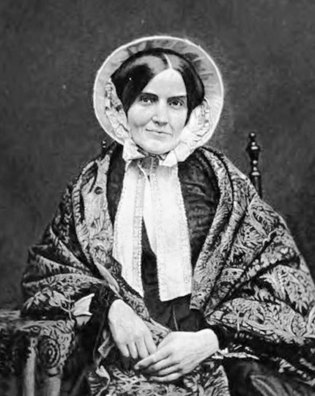 loading
loading
Old Yale“A genius, but mad”Delia Bacon was a pioneering Shakespeare skeptic—and an inspired interpreter of his plays. Judith Ann Schiff is chief research archivist at the Yale University Library.  Wikimedia CommonsThe brilliant Delia Bacon, sister of a Yale professor, endured a damaging romantic scandal but emerged from it to publish a book about Shakespeare that was admired by Emerson and Hawthorne. View full imageDelia Bacon (1811–1859), one of the first to advance a literary argument that William Shakespeare was not the author of Shakespeare’s plays, is known today only to scholars. But in her own time, she was well known at Yale as the sister of an eminent Yale professor—and, much less fortunately, as the center of a scandal that divided the clergy of New England. Delia and her elder brother Leonard were born in the Midwest, where their father, a Congregationalist minister from Connecticut, had worked to convert Indians to Christianity. After the family returned to Connecticut, Leonard attended Yale College, graduating in 1820, and became a minister, anti-slavery leader, and Yale professor (and the author of Yale’s traditional commencement hymn, “O God, Beneath Thy Guiding Hand”). Delia was mentored by Harriet Beecher Stowe’s sister Catharine and became a teacher at the age of 15. At 20 she published her first book, Tales of the Puritans, and won a $100 prize in a short-story contest in which Edgar Allan Poe was a competitor. According to Catharine Beecher, she was highly successful in New Haven, earning a living by delivering history lectures and teaching classes to women, including the wives of governors, professors, and judges. In 1846, Delia became acquainted with Alexander MacWhorter ’42, a much younger Yale Divinity School student who boarded at the hotel where she lived. Their friendship deepened, and throughout the fall, the two of them stayed in the same boarding house at a Northampton, Massachusetts, spa. Catharine and Harriet Beecher Stowe, who were also at the spa, said that to everyone, Delia and MacWhorter appeared to be engaged. But MacWhorter dropped her—a catastrophe for her reputation, because it implied they had never been engaged. Worse still, MacWhorter showed her love letters to his fellow students. Her brother Leonard tried to fight back. In 1847 he brought charges of “slander, falsehood, and conduct dishonorable to the Christian ministry,” asking a jury of 23 ministers to take away MacWhorter’s license to preach. Most of the New England clergy took sides in the notorious case. Among the many witnesses, Harriet Beecher Stowe testified at length: “The attentions paid by Mr. A. to Miss D. were such as are proper for a man to pay only to the woman he intends to marry.” But MacWhorter—who had the support of eminent Yale divinity professor Nathaniel William Taylor ’07—was acquitted in a 12–11 vote. (Ten years later, he would marry the daughter of an industrialist. He never served in a pulpit, but he published a book and several articles before dying childless at 58.) After the acquittal, Catharine Beecher tried to salvage Delia’s reputation with a 300-page denunciation: Truth Stranger Than Fiction: A Narrative of Recent Transactions, Involving Inquiries in Regard to the Principles of Honor, Truth, and Justice, Which Obtain in a Distinguished American University. It was published in 1850, but did not help. Humiliated, Delia had fled to Ohio, where she spent several years in study and seclusion. Eventually, Delia reestablished herself in Boston. Supported at first by liberal Harvard-connected women, she became a teacher again and enthralled her audiences. She also began promoting her belief that Shakespeare was not the real author of his plays—a claim that has been thoroughly debunked, but still attracts some believers today. Earlier skeptics had inspired her, but her literary training led her to expound a new theory: that the ideas expressed in Shakespeare’s plays were similar to those of the philosopher Sir Francis Bacon (no relation) and that Bacon and collaborators had written the plays. Delia developed contacts with leading authors, who admired her interpretations of the plays even if they did not agree with her theory. Nathaniel Hawthorne became a supporter. Ralph Waldo Emerson persuaded a friend to pay for her research trip to England. There, Thomas Carlyle promised to publish her article. She came to believe that evidence of the true authorship was concealed in Shakespeare’s tomb; she remained in England for years, seeking permission to open it—but when permission finally came, she chose not to act on it, probably fearing disappointment. In 1857, with Hawthorne’s secret financial support and his Introduction, she published The Philosophy of the Plays of Shakspere [sic] Unfolded. Its 600 pages featured compelling and eloquent readings of the anguish of Henry IV, Henry V’s musings on kingship, Lear’s debasement, and many other political passages. These inner dramas, she argued, were designed to promote Bacon’s reformist social and political philosophy. After her book was published, Delia suffered a breakdown, and she died in 1859 at the Hartford Retreat for the Insane. She is buried in New Haven’s Grove Street Cemetery, next to her brother Leonard. Emerson called her “a genius, but mad” and ranked her with Walt Whitman “as America’s greatest literary producer of the past ten years.” Hawthorne paid the highest tribute in his autobiography: she “recognized a depth in [Shakespeare’s plays] which scholars, critics, and learned societies...had never imagined to exist there....And when she passed into the better world, I know not why we should hesitate to believe that the immortal poet may have met her on the threshold and led her in,...thanking her...for having interpreted him to mankind so well.”
The comment period has expired.
|
|